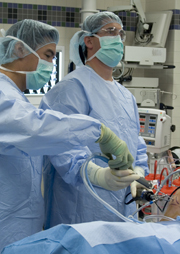Summary
Transplant patients have to take immunosuppressive drugs, many of which have unpleasant side effects, for the rest of their lives to prevent their immune systems from rejecting the graft.
Most of the currently available immunosuppressive drugs focus on countering the action of T cells, white blood cells that play a major role in the immune system by searching out and destroying pathogens that invade the body.
Anita Chong, professor of surgery, pathology and immunology, does not believe, however, that T cells are solely responsible for graft rejection, so she is taking a novel approach to the problem of transplant rejection by examining the role that B cells play in graft tolerance. It has been known for a long time that B cells produce antibodies that attack grafts, but a newly discovered subset of B cells suggests that some B cells also play a regulatory role that can support the induction of tolerance.
"We want to find a way to manipulate the immune system so that it will accept a graft as if it were its own tissue," Chong said. "We hypothesize that both T cells and B cells are central to tolerance."
To test this theory, Chong is performing transplants on mice, inducing tolerance, isolating the type of B cells that she thinks support tolerance, and conducting in vitro tests to see if those cells actually suppress the rejection process.
If the isolated regulatory B cells are potent, researchers will infuse them into mice to see if they enhance tolerance. And if that is successful, Chong will look for a way to produce the desired B cells in a large quantity and test it in clinical trials involving humans. Better yet, she hopes to find a way to induce the human body to produce these beneficial B cells on its own.
"Ultimately, we anticipate that these studies will contribute to the development of a clinical strategy that induces and maintains long-term graft tolerance and survival without the need for immunosuppressive drugs," Chong said.
by Greg Borzo
This award is funded under the American Recovery and Reinvestment Act of 2009, NIH Award number: 1R01AI083452-01. For more information on NIH’s Recovery Act projects, visit .

 Ultrathin but super strong
Ultrathin but super strong
 Addressing Health Disparities
Addressing Health Disparities
 A new way to fight transplant rejection
A new way to fight transplant rejection
 Building a better mouse model
Building a better mouse model
 Testing tools that detect head/neck cancer
Testing tools that detect head/neck cancer
 New equipment opens up the world
New equipment opens up the world
 Tracking climate change by studying solar radiation
Tracking climate change by studying solar radiation

